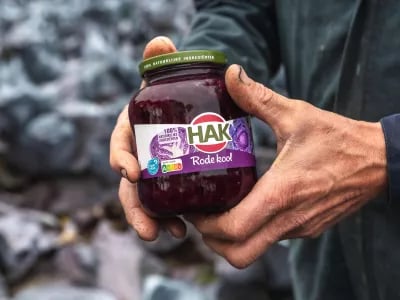At the end of October 2019, vegetable and legume producer HAK presented Carola Schouten, Dutch agriculture minister, with the very first jar of red cabbage to receive ‘On the way to PlanetProof’ certification, which means it has been grown and processed using sustainable methods. This jar comes with a clear message from the company: farmers who invest in sustainable farming must be financially compensated for their efforts by all of the supply chain players.
Farmers who grow their vegetables based on the ‘On the way to PlanetProof’ principles, by necessity, incur additional expenses. Although these added expenses vary depending on the crop, they total approximately 10% for PlanetProof red cabbage. HAK already covers these expenses for its farmers, but believes they should instead be borne by the distribution chain as a whole and intends to advocate for this idea in the immediate future with all of its trading partners and the entities in which it operates.
As Adri den Dekker, HAK’s Director of Purchasing, Agriculture & Sustainability explains, “We believe local, sustainably grown, high-quality food is the future, but it’s clear that this requires additional investments both from growers and from ourselves as the next link in the supply chain. As a producer, we’ll have to deal with greater yield uncertainty, as well as to develop our own processes for the On the way to PlanetProof system. This also applies to the next level down in the supply chain — since ‘On the way to PlanetProof’ is based on a farm-to-table ethos — so it makes sense for the entire chain to add to the kitty. You can’t make farmers pay for the expenses created by the healthier and more resilient environment envisioned by conscious consumers, the business community and the political class.”
According to Den Dekker, the additional expenses generated by growing and processing vegetables and legumes is due to the fact that ‘On the way to PlanetProof’ certification sets a total of 36 extra-statutory requirements for crop protection, soil fertility, biodiversity, landscape management, water and energy consumption, packaging and waste. In addition, growers are required to implement a package of additional measures that have a positive environmental impact, in order to acquire ten mandatory ‘bonus points’.
Fair and reasonable
“If we’re to distribute the additional expenses created by On the way to PlanetProof across the entire distribution chain, consumers will also need to bear their share of the cost. This may mean they will have to pay slightly more for a jar of sustainably grown red cabbage that positively impacts the environment. This seems fair and reasonable to me, although, at the end of the day, it’s the supermarkets that set consumer prices, something over which we have no control”, Den Dekker says.
According to Den Dekker, another factor is that the Netherlands has the lowest per-capita vegetable consumption of any European country while, in proportion to their income, Dutch people also spend very little money on food in general. “We spend, on average, less than 11% of our earnings on food. So we need to realise that we’ve reached the bottom in terms of what food can realistically cost. We feel there must be far greater public awareness of the fact that healthy and sustainable food comes with a price”, says the Purchasing Director.
A positive environmental impact
Thanks to the new On the way to PlanetProof certification, the jars of red cabbage purchased by consumers have more sustainable contents and a more positive environmental impact. This means: lower nitrogen and phosphate emissions as a result of reduced use of fertilisers, healthier and more fertile soil, limited use of pesticides, cleaner surface water and larger populations of useful insects and birds on the land, which (as natural enemies of vermin) contribute to healthy crops. In addition, the stimulus measures associated with ‘On the way to PlanetProof’ cultivation result in reduced consumption of energy and water.
According to the red cabbage farmers involved, Wim and Johannes Straver of the CIGTA agricultural corporation, PlanetProof is first and foremost about improving the health of the soil. Wim Straver points out, “It really all starts with the soil, which may be our greatest asset; therefore, it’s a key focus within the PlanetProof system. After all, strong, resilient soil leads to stronger crops that are more resistant to diseases and plagues; consequently, they require fewer pesticides.”
Organic versus On the way to PlanetProof
Father and son Straver stress that the ‘On the way to PlanetProof’ system requires more effort than traditional cultivation, if only due to all the time and energy that must be invested in administration and transparent documentation. Johannes Straver observes, “You need to satisfy all sorts of requirements, draft an environmental management plan and maintain and update all kinds of reports, which are then checked by an independent agency. You may also have to deal with unexpected visits from time to time.”
Wim Straver points out, “I’m glad my sons want to continue the business and are committed to sustainability. This makes us more resilient, so we don’t get overwhelmed by all the extra work we have to accomplish. We’re involved in many different areas, including organic farming. As with ‘On the way to PlanetProof,’ it’s about sustainability, only it doesn’t work quite the same way. When it comes to organic food, the yield stability required to meet market demand is insufficient, aside from the question of whether there is sufficient land available. PlanetProof enables us to make great progress and take the sustainability measures required for large-scale cultivation.”
Nearby = sustainable farming
HAK aims for sustainable farming because it wants to source good, high-quality and sustainable vegetables and legumes locally (as it has done for over 65 years). This will not be possible in the future without more sustainable farming and processing methods. Den Dekker points out, “In making this choice, we’re securing not only our business operations and reason for existence, but also our mission to help as many people as possible to consume more vegetables and legumes.”
HAK’s first ‘On the way to PlanetProof’ red cabbage is available in stores as from November 2019.













